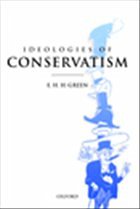John Stuart Mill described the Conservatives as 'the stupidest party', yet they governed the UK for nearly three-quarters of the twentieth century. The Conservative Party at large has typically been and are explicitly anti-intellectual, yet the party is not without an intellectual history of its own. Ideologies of Conservatism charts developments and changes in the nature of Conservative political thought and the meaning of Conservatism throughout the twentieth century. Ewen Green's penetrating study explores the Conservative mind from the Edwardian crisis under Balfour to the Thatcherite 1980s and beyond. It examines how Conservative thinkers, politicians, and activists sought to define the problems they faced, what they thought they were arguing against, and what audiences they were seeking to reach. This is the only study which blends the history of Conservative thought with the party's political action, and it offers significant new insights into the political culture of the 'Conservative Century'.
Review quote:
... erudite ... important, well-organized and lucid ... Green's authoritative handling of the intricacies of economic thought is extremely valuable and his material is clearly and thematically presented. Ideologies of Conservatism should be vital reading not only for historians of the Conservative party and of Conservative thought but for those interested in the intellectual history of Britain and in the fortunes of corporatist ideas in the twentieth century. (MODERNISM/modernity)
Ideologies of Conservatism will be a great eye-opener to historians and philosophers alike ... This is a first-rate, indispensable book. E.H.H. Green's conclusions are cautious, provisional, and based always on scrupulous consideration of the copious evidence and (most importantly) counter-evidence which his impressive industry has unearthed, often from very obscure, unpublished sources. (Robert Grant, Times Literary Supplement)
Suberbly-researched essays on episodes in Conservative history since 1903 ... Green has made an impressive and rich contribution. (English Historical Review)
Easy to read and well worth reading ... Green is a first-rate historian. (London Review of Books)
Rewarding and provocative assembly of essays ... There is a unifying theme running through the book to which each essay makes an accumulating contribution, and which creates both unity and progression in the whole enterprise.Green is at his best in the deployment of close research into the middlebrows of middle England ... The essay on Thatcherism is one of the most subtle in the book, and central to its general construction ... Green is particularly good on the contingent interaction between long-term predispositions or discontents, and immediate events and persons. In his essays on the fall of Lloyd George and the rise of Margaret Thatcher, these two strands are interwoven with great skill.
Ideologies of Conservatism charts developments and changes in the nature of Conservative political thought and the meaning of Conservatism throughout the twentieth century. It is the only study which blends the history of Conservative thought with the party's political action, and it offers significant new insights into the political culture of the 'Conservative Century'.
Review quote:
... erudite ... important, well-organized and lucid ... Green's authoritative handling of the intricacies of economic thought is extremely valuable and his material is clearly and thematically presented. Ideologies of Conservatism should be vital reading not only for historians of the Conservative party and of Conservative thought but for those interested in the intellectual history of Britain and in the fortunes of corporatist ideas in the twentieth century. (MODERNISM/modernity)
Ideologies of Conservatism will be a great eye-opener to historians and philosophers alike ... This is a first-rate, indispensable book. E.H.H. Green's conclusions are cautious, provisional, and based always on scrupulous consideration of the copious evidence and (most importantly) counter-evidence which his impressive industry has unearthed, often from very obscure, unpublished sources. (Robert Grant, Times Literary Supplement)
Suberbly-researched essays on episodes in Conservative history since 1903 ... Green has made an impressive and rich contribution. (English Historical Review)
Easy to read and well worth reading ... Green is a first-rate historian. (London Review of Books)
Rewarding and provocative assembly of essays ... There is a unifying theme running through the book to which each essay makes an accumulating contribution, and which creates both unity and progression in the whole enterprise.Green is at his best in the deployment of close research into the middlebrows of middle England ... The essay on Thatcherism is one of the most subtle in the book, and central to its general construction ... Green is particularly good on the contingent interaction between long-term predispositions or discontents, and immediate events and persons. In his essays on the fall of Lloyd George and the rise of Margaret Thatcher, these two strands are interwoven with great skill.
Ideologies of Conservatism charts developments and changes in the nature of Conservative political thought and the meaning of Conservatism throughout the twentieth century. It is the only study which blends the history of Conservative thought with the party's political action, and it offers significant new insights into the political culture of the 'Conservative Century'.
Review from hardback edition ... erudite ... important, well-organized and lucid ... Green's authoritative handling of the intricacies of economic thought is extremely valuable and his material is clearly and thematically presented. Ideologies of Conservatism should be vital reading not only for historians of the Conservative party and of Conservative thought but for those interested in the intellectual history of Britain and in the fortunes of corporatist ideas in the twentieth century. MODERNISM/modernity

